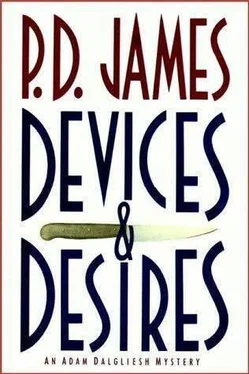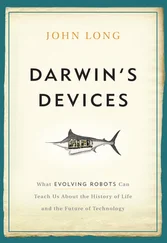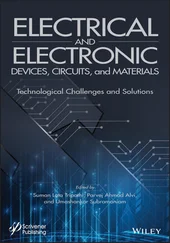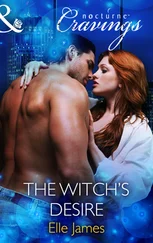'AH right, I won't, but he wouldn't.'
And there was, after all, nothing new to be said. He had heard the questions innumerable times and he had done his best to answer them, with honesty if not with enthusiasm. 'Why does a sensitive poet like you spend his time catching murderers?' 'Which is the more important to you, the poetry or the policing?' 'Does it hinder or help being a detective?' 'Why does a successful detective write poetry?' 'What was your most interesting case, Commander? Do you ever feel like writing a poem about it?' 'The love poems, is the woman you've written them to alive or dead?' Dalgliesh wondered whether Philip Larkin had been badgered about what it felt like to be both poet and librarian, or Roy Fuller on how he managed to combine poetry with law.
He said: 'All the questions are predictable. It would save everyone a great deal of trouble if I answered them on tape, then you could broadcast them from the bus.'
'It wouldn't be at all the same thing. It's you personally they want to hear. Anyone would think you didn't want to be read.'
And did he want to be read? Certainly he wanted some people to read him, one person in particular, and having read the poems he wanted her to approve. Humiliating but true. As for the others; well, he supposed that the truth was that he wanted people to read the poems but not be coerced into buying them, an over-fastidiousness which he could hardly expect Heme & Ulingworth to share. He was aware of Bill's anxious, supplicating eyes, like a small boy who sees the bowl of sweets rapidly disappearing from his reach. His reluctance to co-operate seemed to him typical of much in himself that he disliked. There was a certain illogicality, surely, in wanting to be published but not caring particularly whether he was bought. The fact that he found the more public manifestations of fame distasteful didn't mean that he was free of vanity, only that he was better at controlling it and that in him it took a more reticent form. After all, he had a job, an assured pension and now his aunt's considerable fortune. He didn't have to care. He saw himself as unreasonably privileged compared with Colin McKay who probably saw him – and who could blame Colin? – as a snobbish, oversensitive dilettante.
He was grateful when the door opened and Nora Gurney, the firm's cookery editor, came briskly in, reminding him as she always did of an intelligent insect, an impression reinforced by the bright exophthalmic eyes behind huge round spectacles, familiar fawn jumper in circular ribbing and flat pointed shoes. She had looked exactly the same since Dalgliesh had first known her.
Nora Gurney had become a power in British publishing by the expedience of longevity (no one could remember when she had first come to Heme & Illingworth) and a firm conviction that power was her due. It was likely that she would continue to exercise it under the new dispensation. Dalgliesh had last met her three months previously at one of the firm's periodic parties given for no particular reason so far as he could remember, unless to reassure the authors by the familiarity of the wine and canapes that they were still in business and basically the same lovable old firm. The guest list had chiefly comprised their most prestigious writers in the main categories, a ploy which had added to the general atmosphere of inadvertence and fractionized unease; the poets had drunk too much and had become lachrymose or amorous as their natures dictated, the novelists had herded together in a corner like recalcitrant dogs commanded not to bite, the academics, ignoring their hosts and fellow guests, had argued volubly among themselves and the cooks had ostentatiously rejected their half-bitten canapes on the nearest available hard surface with expressions of disgust, pained surprise or mild, speculative interest. Dalgliesh had been pinned in a corner by Nora Gurney who had wanted to discuss the practicality of the theory she had developed: since every set of fingerprints was unique, could not the whole country be printed, the data stored on a computer and research carried out to discover whether certain combinations of lines and whorls were indicative of criminal tendencies? That way crime could be prevented rather than cured. Dalgliesh had pointed out that, since criminal tendencies were universal, to judge from the places where his fellow guests had parked their cars, the data would be unmanageable, apart from the logistical and ethical problems of mass fingerprinting and the discouraging fact that crime, even supposing the comparison with disease to be valid, was, like disease, easier to diagnose than to cure. It had almost been a relief when a formidable female novelist, vigorously corseted in a florid cretonne two-piece which made her look like a walking sofa, had borne him off to pull out a crumple of parking-tickets from her voluminous handbag and angrily demand what he was proposing to do about them.
The Heme & Illingworth cookery list was small but strong, its best writers having a solid reputation for reliability, originality and good writing. Miss Gurney was passionately committed to her job and her writers, seeing the novels and verse as irritating if necessary adjuncts to the main business of the house which was to nourish and publish her darlings. It was rumoured that she herself was an indifferent cook, one more indication of the firm British conviction, not uncommon in more elevated if less useful spheres of human activity, that there is nothing so fatal to success as knowing your subject. It didn't surprise Dalgliesh that she had seen his arrival as fortuitous and the chore of delivering Alice Mair's proofs as a near-sacred privilege. She said: 'I suppose they've called you in to help catch the Whistler.'
'No, that, I'm thankful to say, is a job for the Norfolk CID. Calling in the Yard happens more often in fiction than real life.'
'It's convenient that you're driving to Norfolk, whatever the reason. I wouldn't really wish to trust these proofs to the post. But I thought your aunt lived in Suffolk? And surely someone said that Miss Dalgliesh had died.'
'She did live in Suffolk until five years ago when she moved to Norfolk. And yes, my aunt has died.'
'Oh well, Suffolk or Norfolk, there's not a lot of difference. But I'm sorry she's dead.' She seemed for a moment to contemplate human mortality and to compare the two counties to the disadvantage of both, then said: 'If Miss Mair isn't at home you won't leave this at the door, will you? I know that people are extraordinarily trusting in country districts but it would be quite disastrous if these proofs were lost. If Alice isn't at home her brother, Dr Alex Mair, may be. He's the Director of the nuclear power station at Larksoken. But perhaps, on second thoughts, you'd better not hand it to him either. Men can be extremely unreliable.'
Dalgliesh was tempted to point out that one of the country's foremost physicists who was responsible for an atomic power station and, if the papers were to be believed, was strongly tipped for the new post of nuclear power supremo, could presumably be trusted with a parcel of proofs. He said: 'If she's at home, I'll hand it to Miss Mair personally. If she isn't, I'll keep it until she is.'
'I've telephoned to say that it's on its way, so she'll be
expecting you. I've printed the address very clearly. Martyr's Cottage. I expect you know how to get there.'
Costello said sourly: 'He can map-read. He's a policeman, remember.'
Dalgliesh said that he knew Martyr's Cottage and had briefly met Alexander Mair but not his sister. His aunt had lived very quietly but neighbours sharing the same remote district inevitably do get to know each other and, although Alice Mair had been away from home at the time, her brother had made a formal visit of condolence to the mill after Miss Dalgliesh's death.
Читать дальше












